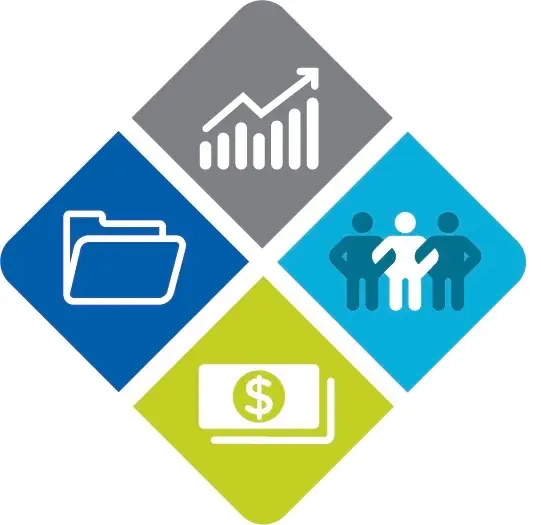In October 2019, the International Coach Federation (ICF) shared the much anticipated updated version of the ICF Core Competency Model.
This model provides a comprehensive set of coaching standards for an ICF credentialed business coach to follow.
As a small business owner looking to hire a business coach, it is essential to know the difference between a credentialed coach who follows the ICF Core Competency Model and those business coaches who do not.
A very well known business coach in my community told me outright that “he did not believe in confidentiality and to make money, he did not need credentials.
He went on to say, ” the experiences from my three failed businesses were enough to make me an expert on what not to do.”
Yikes!!
When you hire an ICF credentialed coach, you can expect that the information you share will be kept confidential.
You will have a coach who will ask effective questions and provide you with the support you need to move forward, in what ever that means to you.
Here is the updated ICF Core Competency Model that provides the guidelines or rules a credentialed coach must follow in a coaching relationship.
Updated ICF Core Competency Model
No other coaching certification body has undertaken this level of research.
Foundation
Demonstrates Ethical Practice
Definition: ICF Credentialed Business Coach understands and consistently applies coaching ethics and standards of coaching.
- Demonstrates personal integrity and honesty in interactions with clients, sponsors and relevant
stakeholders - Is sensitive to clients’ identity, environment, experiences, values and beliefs
- Uses language appropriate and respectful to clients, sponsors and relevant stakeholders
- Abides by the ICF Code of Ethics and upholds the Core Values
- Maintains confidentiality with client information per stakeholder agreements and pertinent laws
- Maintains the distinctions between coaching, consulting, psychotherapy and other support
professions - Refers clients to other support professionals, as appropriate
Embodies a Coaching Mindset
Definition: ICF Credentialed Business Coach develops and maintains a mindset that is open, curious, flexible and client-centered.
- Acknowledges that clients are responsible for their own choices
- Engages in ongoing learning and development as a coach
- Develops an ongoing reflective practice to enhance one’s coaching
- Remains aware of and open to the influence of context and culture on self and others
- Uses awareness of self and one’s intuition to benefit clients
- Develops and maintains the ability to regulate one’s emotions
- Mentally and emotionally prepares for sessions
- Seeks help from outside sources when necessary
Co-Creating the Relationship
Establishes and Maintains Agreements
Definition: ICF Credentialed Business Coach partners with the client and relevant stakeholders to create clear agreements about the coaching relationship, process, plans and goals. Establishes agreements for the overall coaching engagement as well as those for each coaching session.

- Explains what coaching is and is not and describes the process to the client and relevant stakeholders
- Reaches agreement about what is and is not appropriate in the relationship, what is and is not being offered, and the responsibilities of the client and relevant stakeholders
- Reaches agreement about the guidelines and specific parameters of the coaching relationship such as logistics, fees, scheduling, duration, termination, confidentiality and inclusion of others
- Partners with the client and relevant stakeholders to establish an overall coaching plan and goals
- Partners with the client to determine client-coach compatibility
- Partners with the client to identify or reconfirm what they want to accomplish in the session
- Partners with the client to define what the client believes they need to address or resolve to achieve what they want to accomplish in the session
- Partners with the client to define or reconfirm measures of success for what the client wants to accomplish in the coaching engagement or individual session
- Partners with the client to manage the time and focus of the session
- Continues coaching in the direction of the client’s desired outcome unless the client indicates otherwise
- Partners with the client to end the coaching relationship in a way that honors the experience
Cultivates Trust and Safety
Definition: ICF Credentialed Business Coach partners with the client to create a safe, supportive environment that allows the client to share freely. Maintains a relationship of mutual respect and trust.
- Seeks to understand the client within their context which may include their identity, environment, experiences, values and beliefs
- Demonstrates respect for the client’s identity, perceptions, style and language and adapts one’s coaching to the client
- Acknowledges and respects the client’s unique talents, insights and work in the coaching process
- Shows support, empathy and concern for the client
- Acknowledges and supports the client’s expression of feelings, perceptions, concerns, beliefs and suggestions
- Demonstrates openness and transparency as a way to display vulnerability and build trust with the client.
Maintains Presence

Definition: ICF Credentialed Business Coach is fully conscious and present with the client, employing a style that is open, flexible, grounded and confident.
- Remains focused, observant, empathetic and responsive to the client
- Demonstrates curiosity during the coaching process
- Manages one’s emotions to stay present with the client
- Demonstrates confidence in working with strong client emotions during the coaching process
- Is comfortable working in a space of not knowing
- Creates or allows space for silence, pause or reflection
Communicating Effectively

Listens Actively
Definition: ICF Credentialed Business Coach focuses on what the client is and is not saying to fully understand what is being communicated in the context of the client systems and to support client self-expression.
- Considers the client’s context, identity, environment, experiences, values and beliefs to enhance
understanding of what the client is communicating - Reflects or summarizes what the client communicated to ensure clarity and understanding
- Recognizes and inquires when there is more to what the client is communicating
- Notices, acknowledges and explores the client’s emotions, energy shifts, non-verbal cues or other behaviors
- Integrates the client’s words, tone of voice and body language to determine the full meaning of what is being communicated
- Notices trends in the client’s behaviors and emotions across sessions to discern themes and
patterns
Evokes Awareness

Definition: ICF Credentialed Business Coach facilitates client insight and learning by using tools and techniques such as powerful questioning, silence, metaphor or analogy.
- Considers client experience when deciding what might be most useful
- Challenges the client as a way to evoke awareness or insight
- Asks questions about the client, such as their way of thinking, values, needs, wants and beliefs
- Asks questions that help the client explore beyond current thinking
- Invites the client to share more about their experience in the moment
- Notices what is working to enhance client progress
- Adjusts the coaching approach in response to the client’s needs
- Helps the client identify factors that influence current and future patterns of behavior, thinking or emotion
- Invites the client to generate ideas about how they can move forward and what they are willing or able to do
- Supports the client in reframing perspectives
- Shares observations, insights and feelings, without attachment, that have the potential to create new learning for the client
Cultivating Learning and Growth

Facilitates Client Growth
Definition: ICF Credentialed Business Coach partners with the client to transform learning and insight into action. Promotes client autonomy in the coaching process.
- Works with the client to integrate new awareness, insight or learning into their worldview and behaviors
- Partners with the client to design goals, actions and accountability measures that integrate and expand new learning
- Acknowledges and supports client autonomy in the design of goals, actions and methods of accountability
- Supports the client in identifying potential results or learning from identified action steps
- Invites the client to consider how to move forward, including resources, support and potential barriers
- Partners with the client to summarize learning and insight within or between sessions
- Celebrates the client’s progress and successes
- Partners with the client to close the session
A huge thank you to the ICF Credentialing team for putting this document together. Add them up and you will see 63 great reasons why having an ICF credentialed coach is your best option.
Have questions about hiring a business coach or becoming a credentialed business coach?
Reach out anytime.

Reference: Carrie Abner, ICF Director of Credentialing and Accreditation, George Rogers, ICF Director of Quality Assurance, Credentialing and Accreditation, Joel DiGirolamo, ICF Director of Coaching Science (2019) ICF’s Updated Core Competency Model Email to members. November 14, 2019









